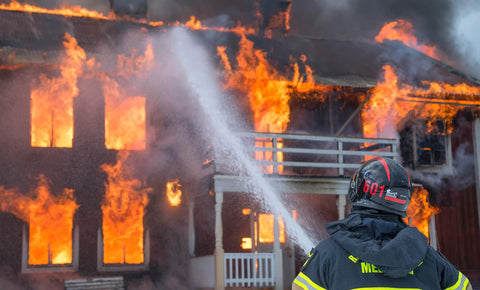How to Prevent Fires In your Garage

Each year, nearly 6,600 fires start in residential garages. These typically aren’t spotted right away. That means they tend to spread farther and cause more damage than those that start in other areas of a home. Hundreds of people are injured and more than 60 die as a result of these each year. The fact is, most of these tragedies could have been avoided with the proper precautions. Taking the time to inspect your garage along with some preventative steps could mean the difference between life and death. With that said, here are some imperative tips homeowners should follow to prevent a fire.
INSPECT YOUR OUTLETS
Faulty or overtaxed electrical outlets are responsible for the majority of garage blazes. Check every outlet to make sure they are in good working order and don’t overload them. Avoid plugging more than one major appliance into each outlet. Check power cords for signs of fraying or breakage.
STORE FLAMMABLE MATERIALS PROPERLY
Most people store highly flammable materials in their garages, which increases the risk. If you have old paint, solvents, varnish or propane that you’ve been meaning to get rid of, find your local hazardous waste disposal facility and take it there as soon as possible. Otherwise, store these in a shed away from your home. Avoid allowing newspapers, cardboard boxes and soiled rags from piling up, as well.
KEEP EXTINGUISHERS HANDY
You should always have an extinguisher in an easy-to-reach spot, where you’ll be able to grab it at a moment’s notice. Be sure you know how to use it and keep it charged regularly.
INSTALL ALARMS
Many people forget about their garages when they install smoke alarms in their homes. In addition, a heat alarm can be faster at detecting when a fire breaks out, giving you the opportunity to put it out before it has a chance to spread.
PROTECT YOUR WALLS
Any walls that connect your house should be reinforced with gypsum board. This will help stop the fire from spreading to the rest of the structure. If you have any living space above it, be sure to use gypsum board on the ceiling, as well.
KEEP DOORS SAFE
Your garage door and the door into your home should be fire-rated for at least 20 minutes or more. This means they should take more than 20 minutes to burn in the event of a blaze. Properly sealing your doors along the bottom also can keep air from getting in and feeding the flames.
PRACTICE SAFE HABITS
When doing any kind of work in this space, be mindful of how it may affect your risk. For example, when woodworking, vacuum all sawdust when you’re done. Make sure the area is properly ventilated when using paints or other materials that could produce flammable gases or vapors.
MAINTAIN YOUR CAR
Your car or truck might be introducing brake fluid or other substances that could ignite. Keep up with your vehicle’s regularly scheduled maintenance and check for leaks underneath.
Your garage may be one of the most likely places for a fire to start — but that doesn’t mean it has to be. Following a few simple recommendations can reduce the chances that your property is struck by a devastating blaze.
